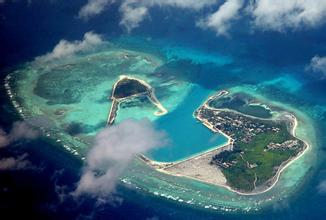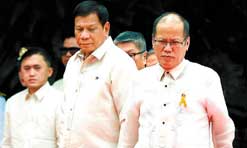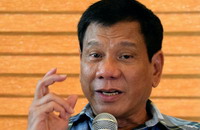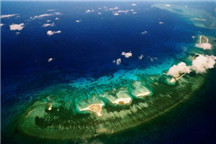There has been widespread sympathy for Penang Chief Minister Lim Guan Eng but he is under pressure to walk the talk and take leave while he clears his name in court.
The only hint that this was no ordinary caravan of vehicles was the flashing lights and siren from an accompanying police car.
The moment had finally come after weeks of speculation. Penang Chief Minister Lim Guan Eng had been arrested and was being escorted to the MACC headquarters to be charged in court the next morning.
It has been a spectacular fall from grace for the DAP leader who rose to power on an awesome wave of popular support and who is known as “Tokong” among the Penang people.
Lim has claimed trial to two charges, one of which pertains to using his position to benefit his wife Betty Chew and himself in the rezoning of a piece of land belonging to a private company known as Magnificent Emblem in 2014.
Another charge is related to his purchase of a bungalow from businesswoman Phang Li Koon a year later at below market value.
Phang, a mysterious figure until thrust into the media spotlight, was charged with abetment in the property transaction.
Gossip and speculation about the nature of the charges have been brewing among the cafe society but everything should be clearer when hearing begins towards the end of the year.
Lim is not the first political head of state to have waded into troubled waters.
Former Selangor mentri besar Dr Mohd Khir Toyo is now on parole after spending six months in jail for purchasing an under-valued “Balinese palace” from a company that had business links with the state government.
Another former Selangor mentri besar, Tan Sri Muhammad Muhammad Taib, also lost his job following the Australian Gold Coast affair that saw him charged with possessing undeclared foreign currency.
The late Datuk Seri Harun Idris was forced by Umno to resign in the 1970s after he was charged for corruption.
Lim is also not the first to resist taking a leave of absence after being charged in court.
Former Sabah chief minister Tan Sri Joseph Pairin Kitingan clung on after being charged for corruption. He was eventually found guilty but his penalty was not great enough to cost him his seat.
But Pairin’s time was old politics and this is supposed to be the era of new politics.
The DAP central executive committee has given Lim a ringing endorsement to stay on in his job on grounds that “there is no question of conflict of interest as Lim has no influence or control over the prosecution”.
It is only expected of DAP to stand by their top leader because if the top man falls, the party will become shaky.
But it also means that DAP is unable to walk the talk. The party is famous for asking others to step down over issues big and small but is unable to live up to the same principle when it involves one of their own. It will be hard for the party to judge others from now on.
It has put DAP figures like their Selangor chairman Tony Pua in an awkward situation. Shortly after the bungalow issue erupted, Pua had said there was no need for Lim to go on leave unless charges were brought against him.
He was quoted in a pro-Pakatan Harapan news portal as saying: “When charged, then (the person) should take time off.”
But legally speaking, the Chief Minister does not need to go on leave even with these kind of charges hanging over his head.
According to a Selangor judicial figure, forcing him out would be pre-judging him.
“He can still chair meetings, make decisions over land and development and sign documents. He can even go on with that tunnel thing.
“But having said that, a politician’s life is not only about legalities but also perception. He is representing a party that lectures others what to do. Can they still do that?” said the judicial figure.
Moreover, the Chief Minister’s focus, said the judicial figure, will now be divided between his case and running the state. There will be complications as the court case drags on.
Lim may not have influence or control over the prosecution but as the Chief Minister, he has control over the civil servants who may be called to testify in his case.
It will be awkward for potential witnesses who are his subordinates because not many people would be comfortable going to court to testify against their boss.
His presence would also bring uncertainty to the state and investors do not like uncertainty.
Still, it is his call and he has the full support of his party including that of party doyen Dr Chen Man Hin whose reputation is impeccable.
The charges against Lim are quite serious and it is only natural that he is doing what it takes to defend himself. Being Chief Minister will give him that much needed clout and back-up to face the complications ahead.
Besides, there is talk of new charges in the works related to the Taman Manggis land and also involving a company with links to “Miss Phang”, as she is known.
But there is also another side to the story why DAP is reluctant to have an acting Chief Minister take over from Lim.
Lim’s deputies are Deputy Chief Minister I Datuk Rashid Hasnon from PKR and Deputy Chief Minister II Dr P. Ramasamy from DAP.
Either one of them could act in Lim’s place if he goes on leave. But the sentiment in this Chinese-dominated party is that senior state executive council member Chow Kon Yeow should be the acting Chief Minister.
DAP would look terrible if Chow leap-frogs over the two deputies. It would only reinforce the perception that DAP is a Chinese chauvinist party.
However, if either Rashid or Dr Ramasamy takes over, the party’s right-wing Chinese base would be badly affected. Caught between the devil and the deep blue sea, DAP probably thought it would be better for Lim to remain at the top.
DAP leaders have slammed the charges as baseless and an attempt to topple a democratically elected leader. It is quite clear they intend to approach this as a political trial and to win over the court of public opinion.
A lot of Lim’s time will be spent convincing the public that he is innocent and a victim. Events like “Walk with Guan Eng” and “Session with the People” have been planned for today.
His supporters have tried to liken his dilemma to what Datuk Seri Anwar Ibrahim went through in 1998. It is not the best of comparisons given that Anwar was able to galvanise a whole generation of young Malays who flooded the streets in anger.
What DAP may have failed to take note of was that many Chinese intelligentsia have been wary of Lim’s leadership since the Mercedes-Benz episode. Lim had opted for a Mercedes S300L as his official car a mere three months after the state purchased a new fleet of Toyota Camry for the state leaders.
This was evident in comments by the Huazong chairman of Negri Sembilan, Lau Zhi Wen, who is as anti-Barisan Nasional as one gets and has often run down the 1MDB issue.
Lau’s comments in the wake of the court case have gone viral among the Chinese-speaking circle.
He recalled the early days when Lim flew economy class and provided hope for change and greater transparency. He said the people had longed for another Datuk Nik Abdul Aziz Nik Mat who was respected for his simple lifestyle.
But Lau said that Lim changed after winning by a bigger majority in 2013.
“Many said you grew arrogant, others still deify you. You changed cars, flew business class and bought a RM5mil bungalow for RM2.8mil,” he said.
Lau said he had high expectations of the Penang Chief Minister but would no longer speak up for him.
The Chinese vernacular press that would have once defended him to the hilt was also visibly neutral. The thing is Lim does not have as many friends in the Chinese media as when he started out as Chief Minister.
The Chinese vernacular media was instrumental in helping to propel DAP to power. They put Lim on a pedestal but now, eight years down the road, many of them have stories to tell about how they were treated by Lim and his staff and they are not pleasant stories.
The same goes for some of the lawyers watching the drama at the Penang courts on Thursday. A few years ago, they would have come out for him but on that day, their response was: “Let justice take its course.”
DAP is hopeful and confident that the court case will swing sympathy and support towards Lim and arrest the resurgence of support for Barisan.
They are painting their secretary-general as a victim of selective prosecution. Lim has also been trying to tug at the heartstrings with famous sayings that he would prefer to die standing than live on bended knees, and playing up his overnight detention at the MACC headquarters.
The court case proper has yet to start but the court of public opinion is already in session.

By Joceline Tan
Who's is who?
Judge: Judicial Commissioner Datuk Azmi Arifin
Accused: 1. Lim Guan Eng 2. Phang Li Koon
Prosecution:
1. Attorney-General Tan Sri Mohamed Apandi Ali 2. DPP Masri Mohd daud 3. DPP Mohd dusuki Mokhtar 4. DPP udiman lut Mohamed 5. DPP Mohd Ashrof Adrin Kamarul 6. DPP Mohd Zain Ibrahim 7. DPP Muhammad Fadzlan Mohd Noorbr
Lim Guan Eng’s counsel:
1. Gobind Singh Deo (lead) 2. Ramkarpal Singh 3. R.S.N Rayer 4. M. Kulasegaran 5. P. Subramaniam 6. M. Manoharanbr
Phang Li Koon’s counsel:
1. Datuk K. Kumaraendran (lead) 2. Dev Kumaraendran 3. Raj Shankar 4. Chetan Jethawanibr />

 Fall from grace: Lim, who is facing two charges of corruption alongside businesswoman Phang (left), will continue as Chief Minister with the full support of his party. (Inset) The prosecution team is led by Attorney-General Tan Sri Mohamed Apandi Ali.
Fall from grace: Lim, who is facing two charges of corruption alongside businesswoman Phang (left), will continue as Chief Minister with the full support of his party. (Inset) The prosecution team is led by Attorney-General Tan Sri Mohamed Apandi Ali.

















